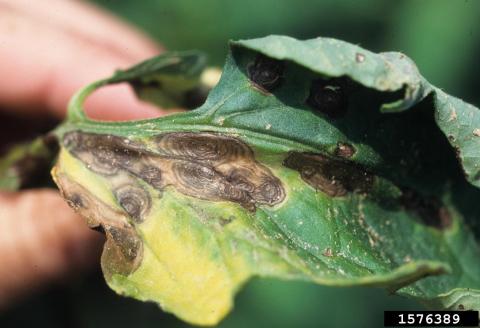How can I keep my tomatoes from getting leaf spots?

Fungal leaf spots can be a serious problem in home vegetable gardens, reducing yields and impacting fruit quality. Two common fungal diseases are early blight and Septoria leaf spot. In order to prevent your tomatoes from getting these diseases and to effectively treat them, you must understand the disease cycle of each fungus as well as identify which disease is causing symptoms in order to manage it successfully.
Symptoms
Early blight can damage both tomato foliage and fruit. Leaf spots develop on the older leaves of the plant, towards the bottom, and move upward to new growth as the disease progresses. The spots initially look like irregular circles. As times goes on, concentric rings form around each lesion, giving them a ring pattern with a distinctive yellow halo. Dark, sunken cankers can also develop on the stems and fruit.
Septoria leaf spot also develops first on the older, lower leaves and can cause complete defoliation in a relatively short period of time. Symptoms include many small, circular, dark spots on the leaves that have grayish centers and dark brown margins. The spots may eventually develop yellow halos as the leaves wilt and die.

Management
Early blight and Septoria leaf spot overwinter in garden soil and crop debris, and infect plants when growing conditions are right. To prevent these diseases, start by thoroughly removing and discarding crop debris at the end of the season. If possible, rotate where you plant tomatoes and related plants (peppers, eggplants, potatoes) each year. Multiyear rotations help limit infection because susceptible plants are kept away from soil-borne fungi. You should also always use disease-free seeds and transplants, as well as disease resistant cultivars, of which there is a growing number to choose from. While it may be too late for these actions to solve disease problems this year, keep them in mind for future years.
Next, make sure tomatoes are grown in a location with full sun and good airflow, as moist and humid conditions encourage fungal growth. Proper staking and pruning will improve air circulation and reduce disease issues. In concert with this, water in the morning if overhead sprinklers are used to allow leaves time to dry throughout the day. Even better, avoid wetting leaves entirely by using soaker hoses or drip irrigation. Consider mulching the soil beneath your tomatoes to prevent soil (and fungal spores) from splashing onto leaves, stems and fruit. Mulch will also help conserve soil moisture and prevent weed growth.
Removing the bottommost leaves from plants may also help prevent infection, as will the application of appropriate preventative fungicides. When using pesticides, always read and follow the label instructions. If you do notice leaf spots on your tomatoes, removing infected leaves will help decrease the number of spores that can cause new infections.
If you think your tomato plants may have a fungal disease problem, Ask UNH Extension or submit a sample to the UNH Plant Diagnostic Lab.
Top Picture: Gerald Holmes, California Polytechnic State University at San Luis Obispo, Bugwood.org
Bottom Picture: Nancy Gregory, University of Delaware, Bugwood.org
UNH Cooperative Extension Master Gardener volunteers share information about home, yard, and garden topics with the people of New Hampshire. Got questions? Master Gardeners provide practical help finding answers to your questions through the Ask UNH Extension Infoline. Call toll free at 1-877-398-4769, Monday to Friday, 9 a.m. to 2 p.m., or e-mail us at answers@unh.edu.
Related Resource(s)
Do you love learning about stuff like this?
SUBSCRIBE TO Granite State Gardening newsletter
Got questions? The UNH Extension Yard and Garden Infoline offers practical help finding answers for your yard and garden questions.
Call toll free at 1-877-398-4769, Monday to Friday, 9 a.m. to 2 p.m., or fill out webform.
